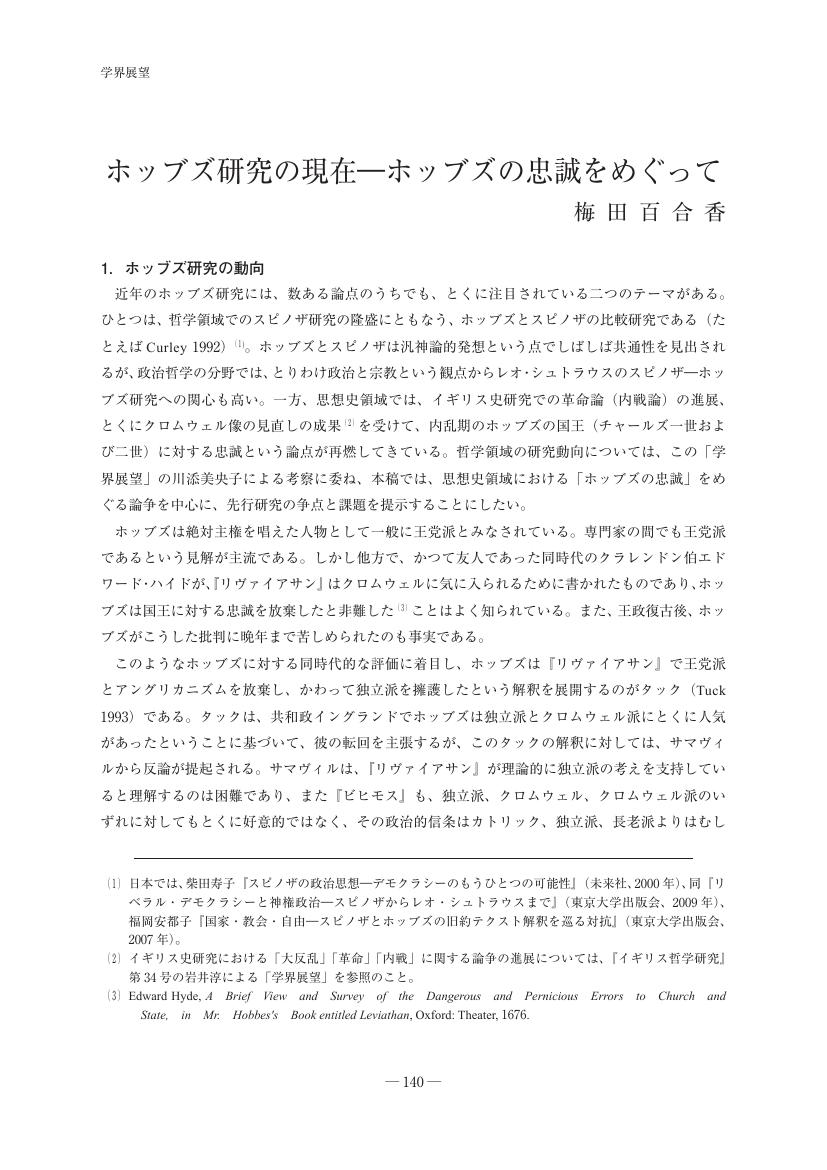3 0 0 0 OA 書評
3 0 0 0 OA 政治における悪とホッブズの道徳哲学(鈴木健教授退任記念号)
- 著者
- 梅田 百合香
- 出版者
- 桃山学院大学
- 雑誌
- 桃山学院大学経済経営論集 (ISSN:02869721)
- 巻号頁・発行日
- vol.57, no.3, pp.7-32, 2016-03-03
Concerning the issue of morality in politics, Machiavelli and Hobbes have often been viewed as "realists," who accepted the evil lurking in human nature as natural and dissociated morality from politics. However, Hobbes himself did not separate politics and morality, and insisted that his political philosophy was also a moral philosophy. This paper examines the logical structure of political and moral theory in Hobbes's Leviathan, focusing on "evil in politics." In Hobbes's moral philosophy, there is no room for evil in politics in the state of nature, meaning the state of a moral vacuum. Evil in politics signifies injustice in society, in other words, intentions or actions that disturb peace in the civil state after a social contract has been made. Hobbes's description of the state of nature demonstrated that peace was the grand foundation for maintaining a society that actualized morality, and could be the criterion of moral judgement for all political actors.
2 0 0 0 OA 書評会『〈助言者〉ホッブズの政治学』
- 著者
- 上田 悠久 梅田 百合香 岡田 拓也 犬塚 元 稲村 一隆
- 出版者
- 茨城大学人文社会科学部
- 雑誌
- 人文社会科学論集 = Studies in Humanities and Social Sciences (ISSN:24368091)
- 巻号頁・発行日
- no.2, pp.245-264, 2023-02
2 0 0 0 IR 『リヴァイアサン』解釈の方法 : ホッブズ研究の批判的考察
- 著者
- 梅田 百合香
- 出版者
- 名古屋大学
- 雑誌
- 名古屋大學法政論集 (ISSN:04395905)
- 巻号頁・発行日
- vol.203, pp.129-172, 2004-06
1 0 0 0 OA ホッブズ研究の現在―ホッブズの忠誠をめぐって
- 著者
- 梅田 百合香
- 出版者
- 日本イギリス哲学会
- 雑誌
- イギリス哲学研究 (ISSN:03877450)
- 巻号頁・発行日
- vol.35, pp.140-149, 2012-03-20 (Released:2018-03-30)
- 参考文献数
- 47
- 著者
- 梅田 百合香
- 出版者
- 岩波書店
- 雑誌
- 思想 (ISSN:03862755)
- 巻号頁・発行日
- no.1130, pp.59-75, 2018-06
- 著者
- 梅田 百合香
- 出版者
- 岩波書店
- 雑誌
- 思想 (ISSN:03862755)
- 巻号頁・発行日
- no.1139, pp.179-185, 2019-03
1 0 0 0 IR ホッブズのリヴァイアサン(三・完) : 十七世紀イングランドにおける政治と宗教
- 著者
- 梅田 百合香
- 出版者
- 名古屋大学
- 雑誌
- 名古屋大學法政論集 (ISSN:04395905)
- 巻号頁・発行日
- vol.191, pp.127-170, 2002-03
1 0 0 0 IR ホッブズのリヴァイアサン(二) : 一七世紀イングランドにおける政治と宗教
- 著者
- 梅田 百合香
- 出版者
- 名古屋大学
- 雑誌
- 名古屋大學法政論集 (ISSN:04395905)
- 巻号頁・発行日
- vol.190, pp.83-127, 2001-12-25


